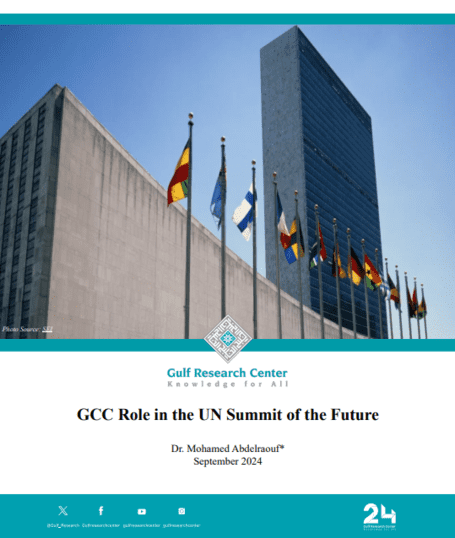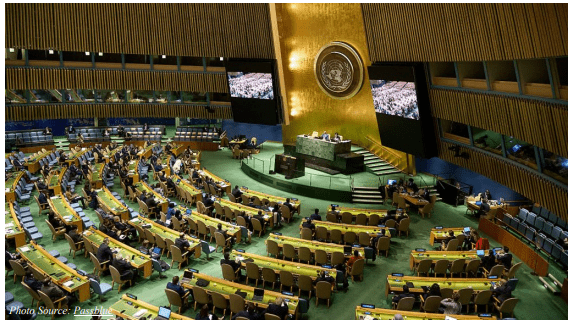
Global crises ranging from climate change to humanitarian issues are a never-ending cause of concern and international organizations play a crucial role in addressing them. The United Nations is the key institution for international relations, and in this capacity it has initiated a multitude of programs and agencies catered to developing a secure and peaceful world, the most recent of which is the upcoming UN Summit of the Future taking place at UN headquarters in New York City, from September 22-23, 2024.
The primary goal of this summit is to present a once-in-a-generation opportunity to address cooperation on critical crises and improve global governance. The pitch originated as a proposal by the UN Secretary General to a call from member states for ideas on how responses to current and future challenges can be better. The proposal, as outlined in “The Common Agenda Report,” involves a call for the re-establishment of trust and solidarity among all people, countries, and generations, and a redesign of current political, economic, and social systems to be fairer and more effective for all.
The Summit of the Future (SOTF) will provide a chance to address the solutions raised in the Common Agenda, as well as to develop potential reforms for an enhanced and renewed multilateral system. Member states have agreed to participate in this ambitious summit, as well as contribute to the expected outcome: A Pact for the Future. The intentions of the Summit and the Pact include reaffirming the UN Charter, reinvigorating multilateralism, implementing existing commitments, agreeing on solutions for current challenges, and restoring trust. It is expected to be an opportunity to redeem global governance, by making it more just and secure, and as such, highly regarded by all stakeholders.
GCC and the SOTF
In terms of reforming the multilateral system, the GCC can play a key role in guiding the efforts. Multilateralism is crucial in the face of the mounting global challenges and difficulties that lie ahead such as poverty, food and energy security, climate change, and threats to peace. GCC unity, alongside other developing countries in search of an improved, fair, and effective multilateral system, will be the most powerful tool, without which efforts to persevere will most likely be in vain.
The GCC countries have taken extensive steps to follow the UN SDG agenda that was initially outlined in 2015. Participating in the UN Summit of the Future would allow the GCC to showcase their progressive achievements and address the prolonged conflicts which linger throughout the Middle East. A prominent example of this is the GCC’s role in the Israel-Palestine crisis, as on several occasions, each member country has voiced advocacy for and/or played a mediating role aimed at a peaceful, two-state solution calling for the legitimacy of the Palestinian State. The countries of the Gulf region could push for peaceful talks and mediation during the SOTF, vocalizing their potential to promote and maintain the goals of the UN SDGs as well as their ability to impact change on a global scale. In addition, the progress achieved following the implementation of each of the GCC member states’ respective national agendas cannot be understated. In a very short amount of time, Saudi Arabia for example, has seen tremendous improvements in meeting the goals of its own Vision 2030.

Furthermore, as the world’s largest oil producers, it is telling that the GCC states have taken the initiative to stray away from fossil fuel burning, instead shifting more to renewable energy. For instance, during the FIFA World Cup in 2022, Qatar built solar plants to meet 10% of the country’s energy needs. In Saudi Arabia, the construction of NEOM, an arising sustainable city, will run uniquely on renewables via a solar fueled green hydrogen plant. These ambitions are expected to result in gratifying increases to the Kingdom’s renewable energy use by 2030 and their NetZero by 2060 promise. Other examples of the region’s keenness to tackle climate challenges as well as their commitment to alleviating the effects of climate change and share initiatives, programs and achievements, are the hosting of COP28 by Dubai in December 2023, Saudi Arabia’s Middle East Green Initiative, and NetZero goals by 2050 for the UAE and Oman. Taken together, the Gulf countries are well positioned to act as global leaders in the investment for sustainable development, backed by tangible progress already achieved in this endeavor.
In conclusion, as the Summit of the Future approaches, it can be argued that GCC countries have taken extensive measures to achieve sustainable development goals. However, to create a secure future, all countries should call for a reformation of global governance to one that is better suited for addressing sustainability issues. Considering the grand scale of global peace and security challenges, the GCC countries could play a key role in the success of the Summit in paving the way to a sustainable future for all.
In conclusion, while regional stability remains critical to the Gulf states' economic growth and the protection of their national interests, managed regional tensions can provide unique opportunities to increase diplomatic leverage through careful use of these tensions. The Gulf states can secure their position as indispensable players in the regional and international arenas. However, this approach requires a careful balance to ensure that tensions do not escalate in ways that threaten the stability that Gulf states work so hard to maintain.
Although this may seem like an unconventional perspective on tensions and conflicts, it rests on the simple truth that there are advantages to being out of the spotlight. When neighbors are preoccupied in conflict with each other, it opens the door for one to step in and fill the voids left open. And, often found within those voids are opportunities that might not have been there otherwise.
*Dr. Abdelraouf is the Director of the Environmental Security and Sustainability Research Program at the Gulf Research Center.
